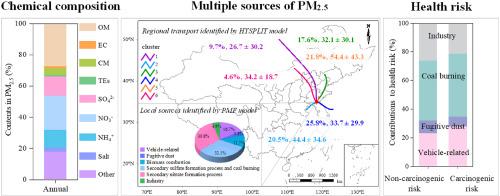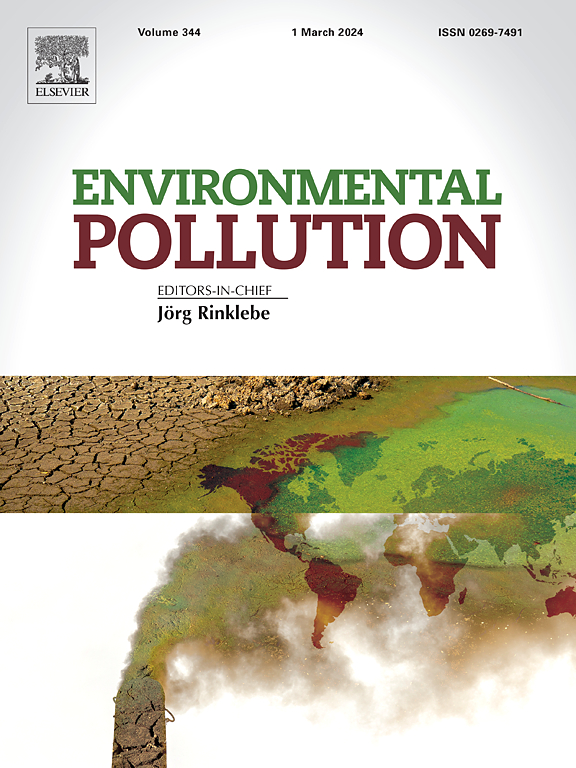PM2.5 的化学成分、多重来源与健康风险:中国板材与物流之都临沂的案例研究
IF 7.6
2区 环境科学与生态学
Q1 ENVIRONMENTAL SCIENCES
引用次数: 0
摘要
阐明细颗粒物(PM2.5)的化学成分、来源和健康风险对于有效预防和控制空气污染至关重要。本研究采集了 2021 年 11 月 10 日至 2022 年 10 月 15 日临沂市的 PM2.5 样品,时间跨度为 2022 年冬奥会和冬残奥会期间。分析的重点是 PM2.5 化学成分的季节性变化,包括水溶性离子、无机元素和碳质气溶胶。随机森林模型的结果表明,奥运会和残奥会期间的控制措施使临沂的 PM2.5 浓度降低了 21.5%。有机物是 PM2.5 的主要成分,其次是 NO3-、SO42- 和 NH4+。在次生无机离子中,SO42- 在夏季浓度最高,而 NO3- 和 NH4+ 浓度最低。无机元素 S、K、Fe 和 Si 的年均浓度较高,这说明临沂的板材生产、散煤燃烧和生物质燃烧需要采取有针对性的控制措施。临沂的有机碳(OC)与元素碳的比值(17.7-20.5)较高,凸显了解决有机碳二次污染的重要性。根据正矩阵因式分解模型,燃煤以及硫酸盐和硝酸盐的二次形成过程是 PM2.5 的主要来源。后向气团轨迹显示,临沂的东南部、本地和西南部地区对PM2.5有很大贡献。这表明临沂与山东省日照市、济宁市等周边城市以及江苏省北部城市之间需要加强区域联防联控。砷的非致癌风险和致癌风险(CRs)最高,燃煤的非致癌风险和致癌风险适中,分别占总健康风险的 41.7% 和 44.0%。这些发现对于制定有效的空气污染预防和控制策略至关重要。本文章由计算机程序翻译,如有差异,请以英文原文为准。

Chemical composition, multiple sources, and health risks of PM2.5: A case study in Linyi, China’s plate and logistics capital
Elucidating the chemical composition, sources, and health risks of fine particulate matter (PM2.5) is crucial for effectively preventing and controlling air pollution. This study collected PM2.5 samples in Linyi from November 10, 2021, to October 15, 2022, spanning the period of the 2022 Winter Olympics and Paralympics. The analysis focused on seasonal variations in the chemical composition of PM2.5, including water-soluble ions, inorganic elements, and carbonaceous aerosols. Results from the random forest model indicated that control measures during the Olympics and Paralympics reduced PM2.5 concentrations by 21.5% in Linyi. Organic matter was the dominant component of PM2.5, followed by NO3–, SO42–, and NH4+. Among secondary inorganic ions, SO42– exhibited the highest concentration in summer, while NO3– and NH4+ showed the lowest concentrations. The inorganic elements S, K, Fe, and Si had high mean annual concentrations, underscoring the need for targeted control measures for plate production, bulk coal burning, and biomass combustion in Linyi. The organic carbon (OC) to elemental carbon ratio (17.7–20.5) in Linyi was high, highlighting the importance of addressing secondary OC pollution. According to the positive matrix factorization model, coal burning, and the secondary formation processes of sulfate and nitrate were the dominant sources of PM2.5. Backward air mass trajectories revealed substantial contributions from the southeastern, local, and southwestern regions of Linyi. This suggests the need for enhanced regional joint prevention and control efforts between Linyi and neighboring cities, such as Rizhao and Jining in Shandong Province, as well as northern cities in Jiangsu Province. The highest non-carcinogenic and carcinogenic risks (CRs) were associated with As. coal burning posed significant noncarcinogenic risks and a moderate CR, contributing 41.7% and 44.0% of the total health risk, respectively. These findings are crucial for developing effective air pollution prevention and control strategies.
求助全文
通过发布文献求助,成功后即可免费获取论文全文。
去求助
来源期刊

Environmental Pollution
环境科学-环境科学
CiteScore
16.00
自引率
6.70%
发文量
2082
审稿时长
2.9 months
期刊介绍:
Environmental Pollution is an international peer-reviewed journal that publishes high-quality research papers and review articles covering all aspects of environmental pollution and its impacts on ecosystems and human health.
Subject areas include, but are not limited to:
• Sources and occurrences of pollutants that are clearly defined and measured in environmental compartments, food and food-related items, and human bodies;
• Interlinks between contaminant exposure and biological, ecological, and human health effects, including those of climate change;
• Contaminants of emerging concerns (including but not limited to antibiotic resistant microorganisms or genes, microplastics/nanoplastics, electronic wastes, light, and noise) and/or their biological, ecological, or human health effects;
• Laboratory and field studies on the remediation/mitigation of environmental pollution via new techniques and with clear links to biological, ecological, or human health effects;
• Modeling of pollution processes, patterns, or trends that is of clear environmental and/or human health interest;
• New techniques that measure and examine environmental occurrences, transport, behavior, and effects of pollutants within the environment or the laboratory, provided that they can be clearly used to address problems within regional or global environmental compartments.
 求助内容:
求助内容: 应助结果提醒方式:
应助结果提醒方式:


